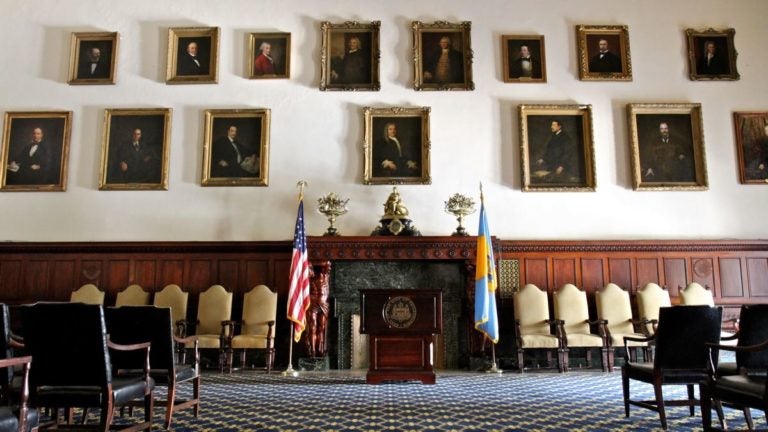Government service is a ministry. Its ministers must be noble.
Rev. Malcolm Byrd — a public theologian who ended a 45-year career in government without scandal — writes about faith, morality and combating corruption.

Mayor's Reception Room (Emma Lee/WHYY)
In 1975, I began my career in public service.
My first job was a cook-trainee assigned to the House of Correction, a soon-to-be shuttered prison in Northeast Philadelphia.
From day one as a city employee, my commitment was to enhance the quality of life of every Philadelphian who crossed my path.
My reason for such altruism was inspired by the Bible.
In 2 Kings 12:13-15, those entrusted with the funds to pay laborers for their work had reputations of such honesty, that it was not necessary to supervise them.
Throughout my public career, my conduct of honesty and integrity has best represented the Lord I serve. In 2015, I retired from the Mayor’s Office of Faith Based Initiatives, where I served as Director under Mayor Michael A. Nutter.
Proudly, I ended a 45-year career in public service with an unblemished record: no scandals, no indictments, no forced resignations.
For me, public service was and continues to be, an inviolable sacred trust. I have always acknowledged that God desired integrity from me. And I’ve long understood what an honor it is to be trusted with the public’s resources.
There were instances during my career where bad actors sought to compromise me. But I pointedly asserted that if what they proposed was illegal or unethical, then I had no interest in the conversation.
I’ve never sought favors of any kind, nor have I solicited gifts from lobbyists. Why? Because government service is a ministry and its ministers must be noble.
My advice to citizens of all ages: If you desire a career in which you can profit, it’s better that you work in the private sector rather than render dishonor onto the public square.
***
Judging recent news cycles, it would seem that the order of the day is to return to the Gilded Age, an era in history — between the Civil War and the turn of the 20th Century — when graft, influence-peddling, abuse of power and hyper-partisanship appeared inescapable.
For example, during the Gilded Age, the New York legislature essentially legalized bribery.
That was 1868.
More than 150 years later, the Trump Administration is said to be considering changes to the country’s global anti-bribery law, essentially making it easier for American companies to pay bribes to secure contracts overseas.
It is as if we’re living in an alternate reality that accommodates the ridiculous.
Every honest person should be indignant at the occurrences of misconduct by public servants, such as a U.S. president who vows to stonewall all subpoenas while simultaneously soliciting foreign help in an American election, a former Pennsylvania State Representative who pled guilty to stealing $500,000 from her own charity, or a Philadelphia Common Pleas Court Judge who admitted to 10 counts of judicial misconduct.
Could the aforementioned instances of malfeasance hint at a new public service ethos? Are we really at such a place in society where we can carelessly dispose of old-fashion values of honesty, integrity and ethics?
Nearly sixty years ago, Rev. Dr. Martin Luther King, Jr. prophetically described today’s moral and ethical relativism: “We have come to believe that morality is a matter of group consensus. We attempt to discover what is right by taking a sort of Gallup poll of the majority opinion. Everybody is doing it, so it must be all right, and therefore we are caught in the clutches of conformity.”
We, the people, should demand more of our public servants. We shouldn’t make excuses for their bad behavior. We shouldn’t allow their good deeds to absolve them from accountability for their bad behaviors. And we absolutely cannot remain silent or simply shake our heads in disappointment.
As voters, let us be more thorough in vetting candidates for office. Specifically, let’s perform a more robust inquiry into a candidate’s character and values. For the sake of the republic, there must be initial and periodic integrity audits of our public servants.
Behavioral and cultural changes happen when new norms are established. Would these new norms be more demanding than those of the past? Yes! But the changes would be worth it.
The only other option is to give up and accept that malfeasance and public service go hand-in-hand.
WHYY is your source for fact-based, in-depth journalism and information. As a nonprofit organization, we rely on financial support from readers like you. Please give today.




